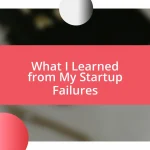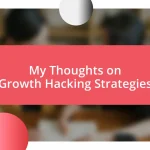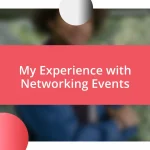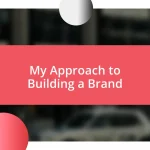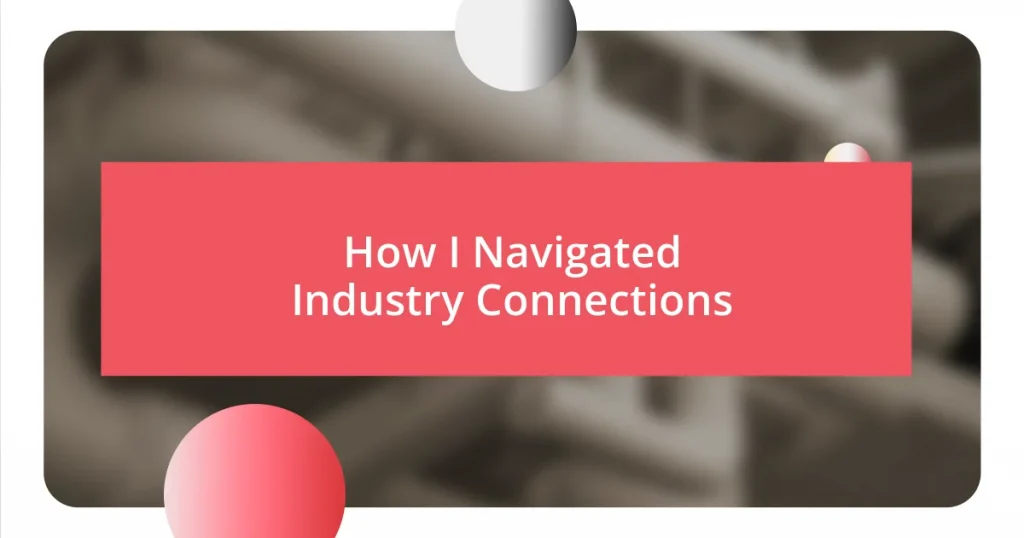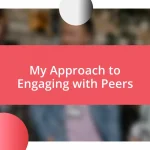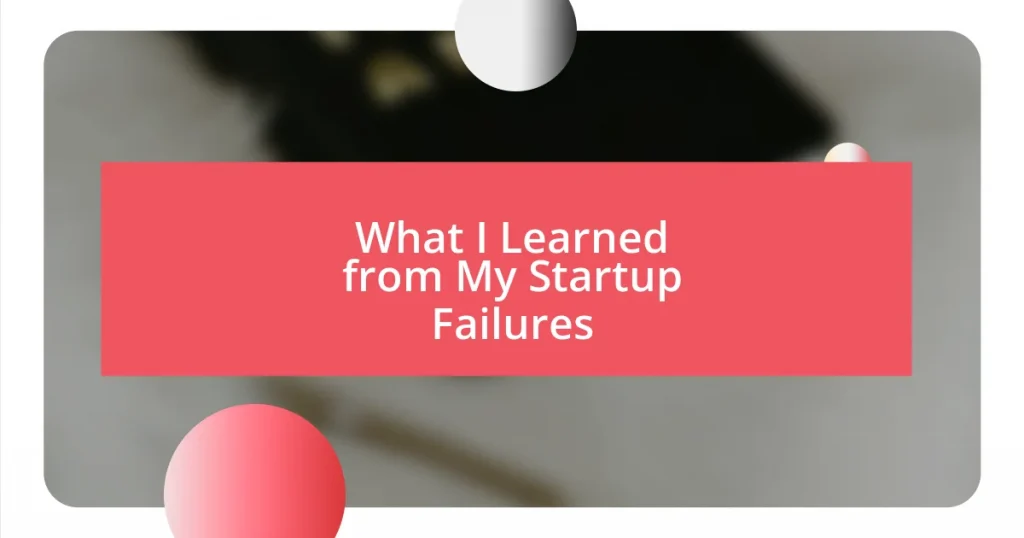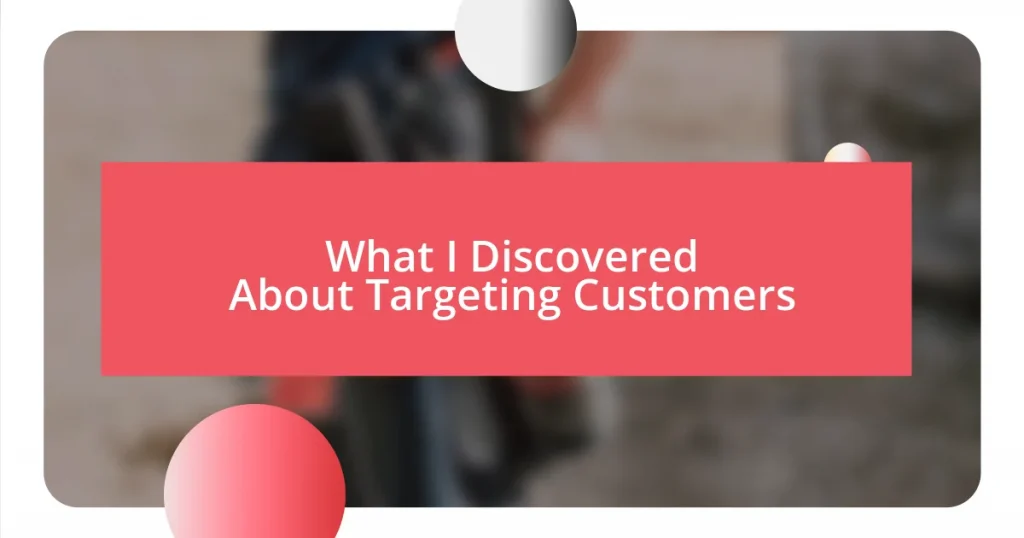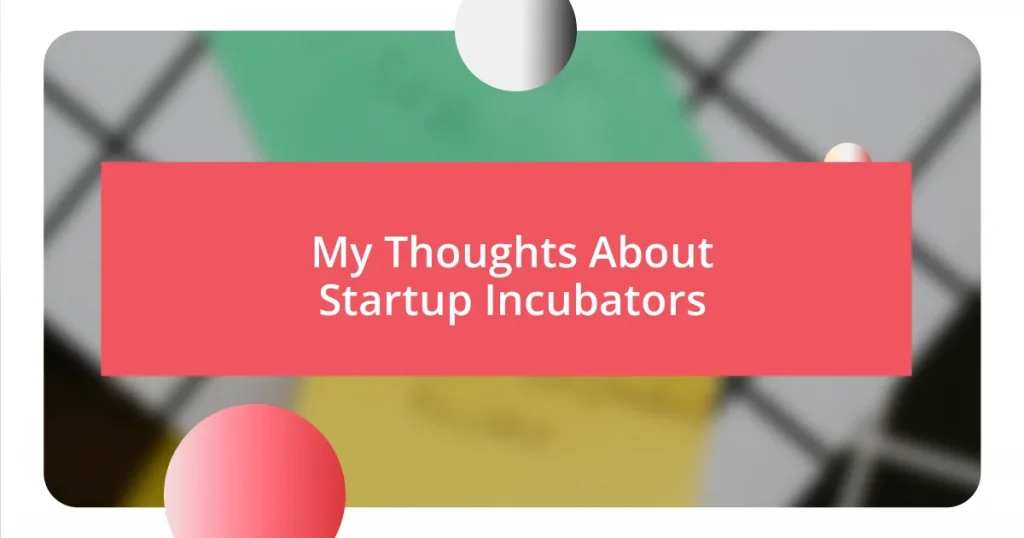Key takeaways:
- Networking is essential for career growth and can lead to meaningful connections, such as mentorships that significantly impact professional development.
- Identifying and attending key industry events, especially smaller gatherings, fosters deeper conversations and enriches one’s network.
- Maintaining relationships requires consistent effort, genuine follow-up, and personalized interactions, which can turn casual contacts into valuable collaborations.
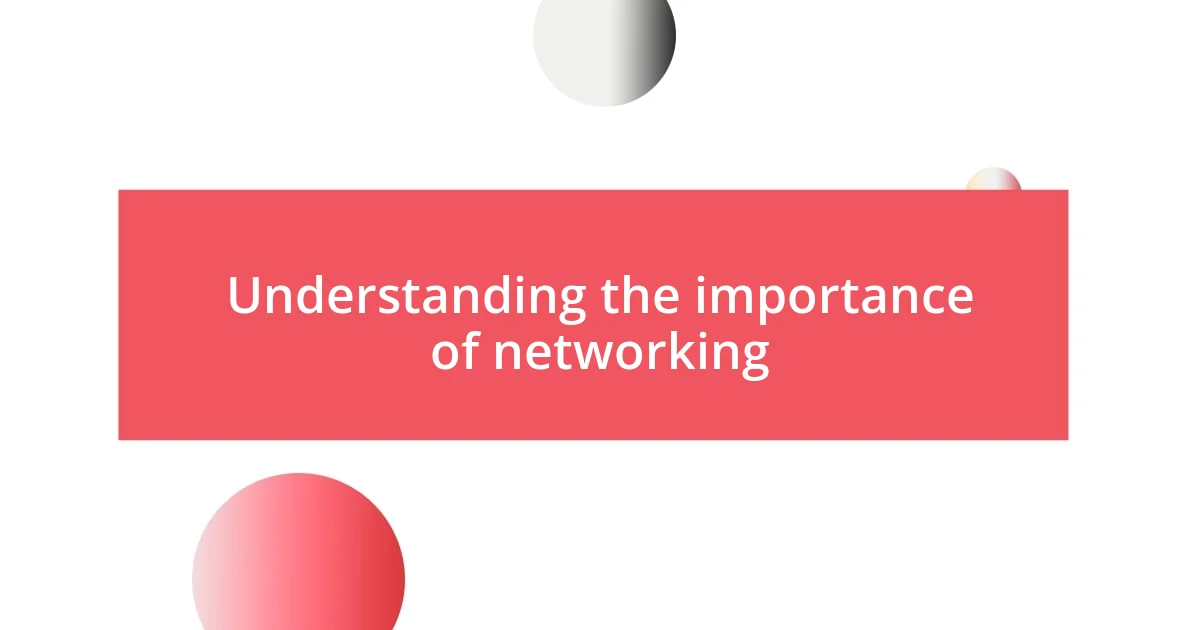
Understanding the importance of networking
Networking is more than just a buzzword; it’s a lifeline to opportunities. I remember attending my first industry conference, feeling overwhelmed but curious. It wasn’t just about exchanging business cards; it was about forging connections with people who shared my passion and drive. Have you ever thought about how a single conversation can open doors you didn’t even know existed?
In my experience, the relationships you build have the potential to change the course of your career. I once met someone over coffee who later became my mentor, guiding me through a particularly challenging project. That casual encounter transformed into a connection that I cherish to this day. Isn’t it amazing how one moment can lead to lasting impact?
Ultimately, networking fuels collaboration and creativity. When I initially hesitated to reach out to industry leaders, I realized that many of them genuinely enjoy sharing their insights and experiences. Isn’t it refreshing to think that you’re not just asking for help, but inviting someone to share a piece of their journey with you? That mindset shift has helped me connect authentically and, in turn, build a robust network that enriches my professional life.
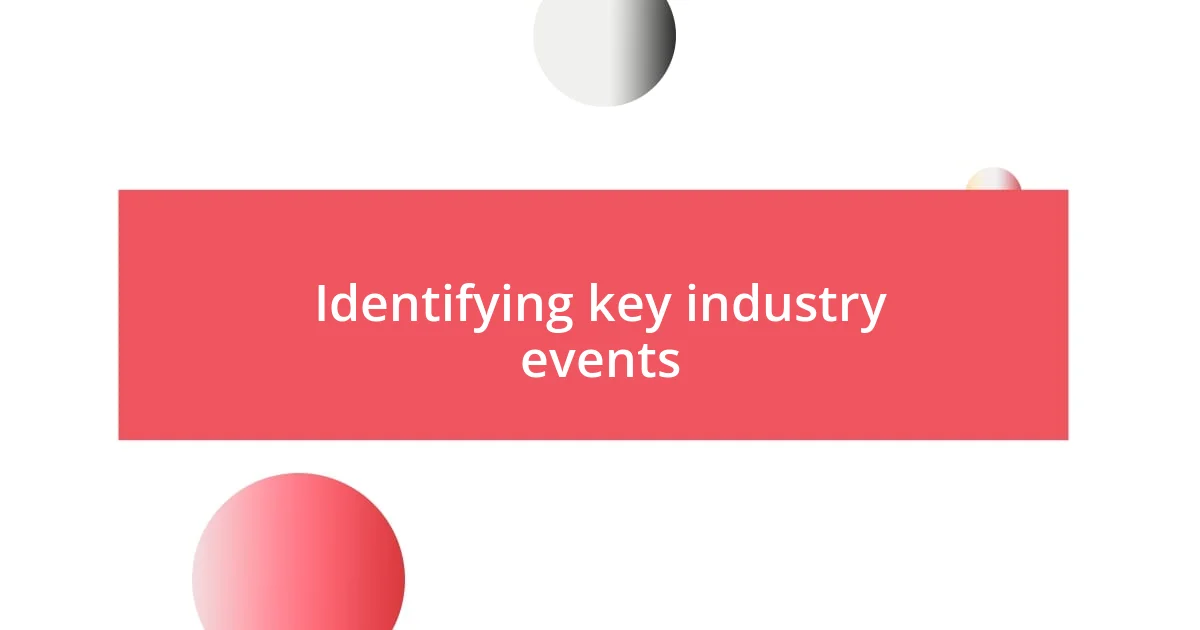
Identifying key industry events
Identifying key industry events can feel like searching for hidden treasures. During my first year in the field, I discovered industry conferences and workshops were essential in expanding my professional horizon. I often would scour social media and industry newsletters to pinpoint events that aligned with my interests, noticing how each event brought together diverse voices and experiences that enriched my understanding.
One time, I stumbled across an intimate networking dinner organized by a local association. It was a game changer. The warmth in the room was palpable as we shared our stories, inspiring me to dig deeper into my own career path. I realized that smaller gatherings often yield more meaningful conversations. Have you ever found that the size and format of an event can influence the connections you make?
Creating a list of must-attend events can be a straightforward yet effective strategy. Using platforms like Eventbrite and LinkedIn helped me identify upcoming industry gatherings quickly. I made it a point to attend at least one new event each month, which not only kept my network fresh but also opened doors to unexpected opportunities. I encourage you to seek those unique events—whether they are webinars, workshops, or casual meetups—where you can engage with like-minded individuals who inspire you.
| Event Type | Characteristics |
|---|---|
| Conferences | Large gatherings with keynote speakers and sessions |
| Workshops | Hands-on sessions that promote interactive learning |
| Networking Dinners | Intimate settings conducive to deep discussions |
| Webinars | Accessible online events allowing participation from anywhere |
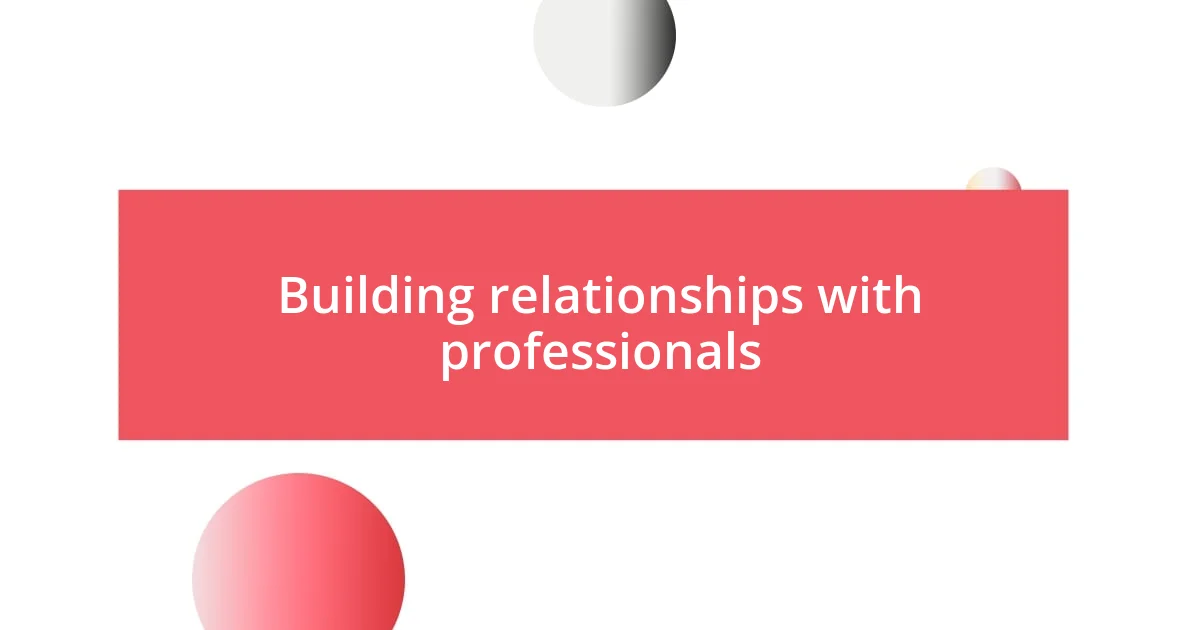
Building relationships with professionals
Building relationships with professionals requires intentionality and a genuine approach. One of the most effective strategies I’ve found is simply being present and engaged in conversations. I recall an event where I nervously approached a panelist after a session. Instead of diving straight into my pitch, I asked about their favorite projects. That small change allowed for a natural conversation, and it felt less like a networking attempt and more like a casual exchange of ideas. These moments often feel more impactful and memorable.
Here are some tips that have helped me nurture professional relationships:
- Listen actively: Genuine interest in others fosters trust and respect.
- Follow up: A quick email or message highlighting a specific point from your conversation can significantly impact how you are remembered.
- Offer value: Think about how you can assist others in their careers, whether through sharing resources or making introductions.
- Be authentic: Show your true self; people connect better when they sense sincerity.
- Regular check-ins: Maintaining contact through occasional messages keeps the relationship alive and demonstrates that you care.
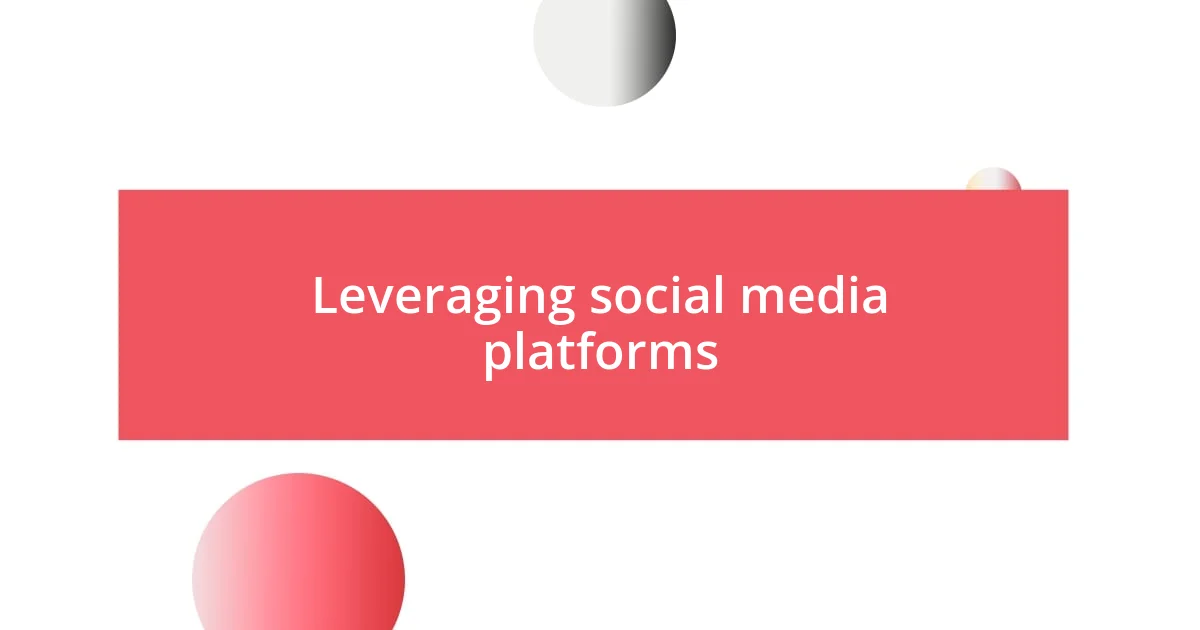
Leveraging social media platforms
Leveraging social media platforms can be a powerful tool in expanding your professional connections. Early in my career, I realized that sites like LinkedIn weren’t just for showcasing my resume—they were arenas for engagement. I vividly remember posting an article I wrote about industry trends and how amazed I was by the surge of comments, likes, and shares. It felt like opening a door to a room filled with professionals eager to discuss shared interests. Have you ever experienced that rush of validation when your thoughts resonate with others?
When I navigated Twitter, I discovered a world brimming with quick insights and real-time conversations. Participating in trending hashtags related to my field led to some lively exchanges. One time, I took part in a Twitter chat hosted by a leading expert. Engaging in back-and-forth dialogue made me feel part of a vibrant community and opened the door to opportunities I never anticipated. It’s fascinating how a simple tweet can transform a casual viewer into a conversation partner, don’t you think?
I learned that consistency is key in leveraging social media. By regularly sharing content, commenting on posts, and engaging with others, I cultivated a recognizable online presence. Just the other day, someone reached out to collaborate because they recognized my posts on sustainable practices in our industry. I can’t stress enough the importance of being authentic and showing your personality—people want connections that feel real and relatable. What’s holding you back from sharing your voice online?
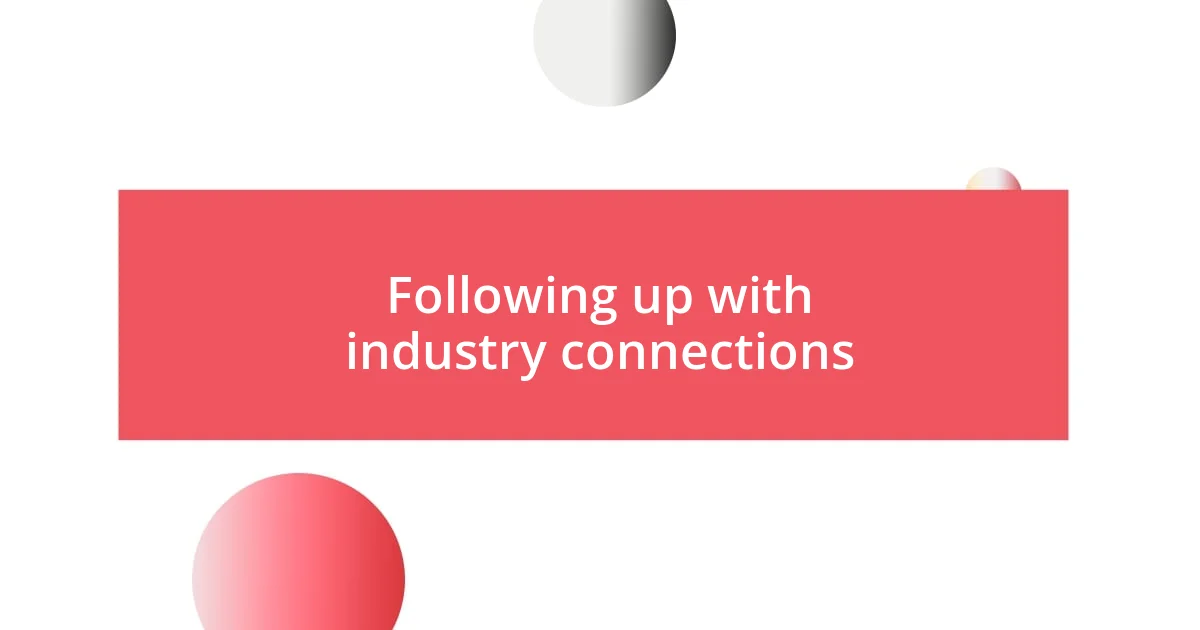
Following up with industry connections
Following up with connections is a crucial step that can often be overlooked. I remember after attending a workshop, I exchanged contact information with an industry leader who had fascinating insights on sustainable practices. A few days later, I shot them an email thanking them for their time and shared a resource they had mentioned. Their immediate response caught me off guard, and it solidified our connection in a way that felt mutually beneficial.
Sometimes, a simple message can reignite a conversation. A couple of months later, I noticed a new post from that same leader on LinkedIn discussing a project that intrigued me. I commented with my thoughts and sent a follow-up message. To my surprise, they not only responded but invited me to join an upcoming webinar. What better way to get involved than by being proactive in following up on mutual interests?
In my experience, I’ve found that it’s the personal touch in a follow-up that creates lasting impressions. Rather than sending a generic message, I like to reference specific topics we’ve discussed or shared experiences. I once reached out to a connection about an article they wrote, and within a week, we met for coffee to dive deeper into our shared interests. Have you ever thought about how such personalized touches can lead to unexpected opportunities?
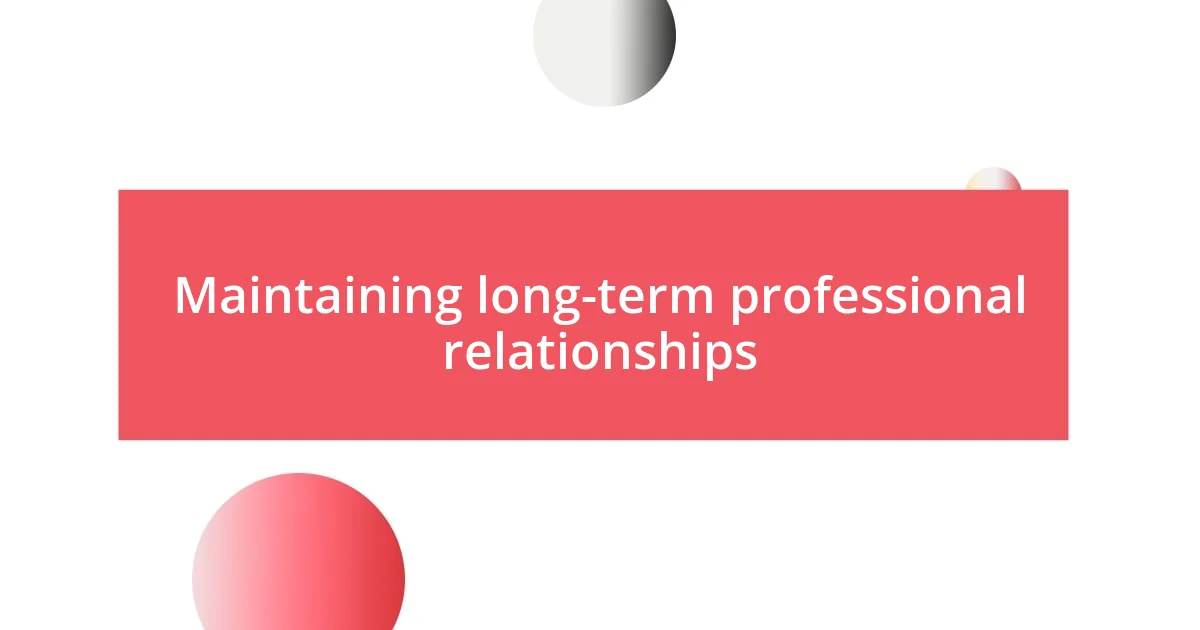
Maintaining long-term professional relationships
Maintaining long-term professional relationships requires consistent effort, and I discovered this firsthand. Last year, I attended a conference where I met several promising contacts. Instead of just exchanging business cards, I made it a point to schedule informal follow-up coffee chats with them. Each time, I asked about their projects and shared my progress, turning a mere acquaintance into a valuable ongoing dialogue. Have you ever found that regular, low-pressure check-ins can truly deepen a connection?
I’ve learned that shared experiences amplify relationships. For instance, I collaborated with a colleague on a project that wasn’t just a work assignment but an adventure. We spent late nights brainstorming and troubleshooting, which naturally led to celebrating our small victories together. That collaboration didn’t stop with the project; we continue to share articles, recommend resources, and even chat about our career aspirations. Isn’t it fascinating how such experiences can keep the relationship alive long past the project’s conclusion?
Trust is another cornerstone of maintaining these connections. I strive to be reliable, whether it’s by keeping my word on deadlines or by sharing valuable insights without expecting anything in return. I once received a crucial referral from a contact I had nurtured for years, solely because they knew they could count on me. It made me realize that relationships thrive on reciprocity. How often do you reflect on the ways you can contribute positively to your network?
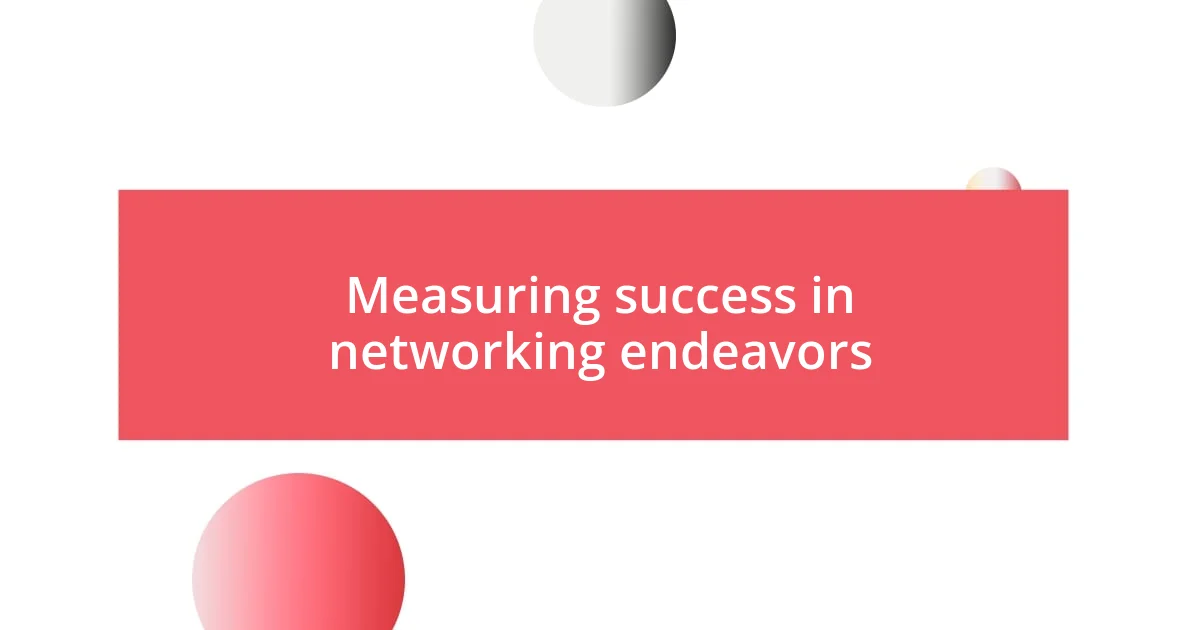
Measuring success in networking endeavors
Measuring success in networking endeavors isn’t just about the number of business cards you collect; it’s about the quality and depth of those relationships. I once thought that simply adding connections on LinkedIn was enough. It was eye-opening when I realized that the real indicator of success was the follow-through—those moments when a connection not only acknowledged my message but also offered insights or opportunities that enriched my professional life. Don’t you think that genuine engagement is often a more telling measure of success than a lengthy list of contacts?
Another way I gauge my networking success is by tracking the evolution of these relationships over time. For instance, I had a casual coffee chat with a fellow attendee at a seminar. Fast forward a few months, and we found ourselves collaborating on a project that significantly impacted both our careers. It dawned on me that successful networking isn’t always immediate; it’s about planting seeds and nurturing them, allowing them to blossom into fruitful partnerships down the line. Have you ever noticed how some connections surprise you by transforming into something far more significant than you originally expected?
Ultimately, I believe measuring success in networking boils down to how often you can leverage those connections to achieve your goals. One time, I reached out to an old contact for advice on a career pivot I was considering. Not only did they share invaluable insights, but they also connected me to someone who ultimately led me to a job opportunity. That experience reinforced my belief that effective networking is about creating a support system where both parties can benefit. Isn’t it rewarding when your network not only supports but also propels you forward?
